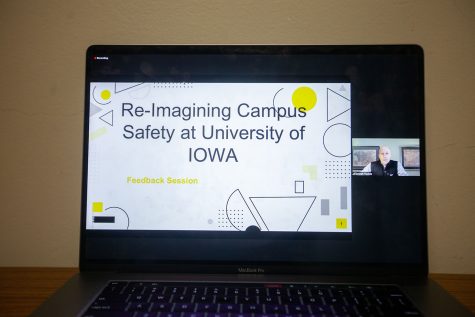USG votes down Jewish Constituency Senator position
USG failed to pass legislation that would implement a Jewish Constituency Senator to address issues of anti-Semitism on campus.
The Old Capitol building is seen on March, 6, 2021.
March 24, 2021
Following reports of anti-Semitism on campus, the University of Iowa, Undergraduate Student Government voted against legislation that would create a Jewish Constituency Senator. After nearly three hours of debate, the legislation narrowly failed to pass.
Twenty-four senators voted yes, and 15 voted no, with one senator abstaining. The legislation required a two-thirds majority to pass, or 27 votes.
UI senior Kendall Michaels initially contacted USG with concerns about anti-Semitism on campus and testified at the meeting. Michaels, who identifies as Jewish, said that coming from a predominantly Jewish suburb to the University of Iowa was a culture shock.
“I grew up where everyone was Jewish, people knew what a Jew was, and I came here and I had people asking me if I had horns and other crazy questions because they had never met a Jew before,” Michaels said. “At the end of my freshman year, I came across somebody that I knew who was a year older than me that posted a Snapchat story where he had drawn in a swastika and the caption was ‘I hate all Jews.’”
Michaels said after reporting the incident, nothing happened to the student. She talked to other Jewish students who told her they had also experienced anti-Semitic microaggressions while attending the university.
USG has seven constituency senators that represent various identities on campus. During the debate, those that opposed the legislation argued that due to the diversity of the campus, not all marginalized groups can be represented with a constituency senator.
LGBTQ+ Constituency Senator Nick Nachtman voted against the legislation. Nachtman said anti-Semitism needs to be addressed on campus in another fashion.
“I’m worried that constituency senator positions will become ineffective if we continue to expand them and they will instead just become tokenism,” Nachtman said. “I wanted to ensure that if we are going to give a voice to Jewish students, which we absolutely need to, the way we are doing it needs to be effective and work for everyone,”
Nachtman said he wants Jewish students to know that he is with them at the forefront of the fight against anti-Semitism and he plans to show his support in his work as a USG senator — just not in the form of an additional constituency senator.
“If we are not addressing anti-Semitism when it is on campus, we are failing,” he said. “Moving forward, I want to work legislation and work on ways to change our committees and representation.”
Iowa City reported nine incidents of anti-sematic vandalism between 2019-2020, according to the Anti-Defamation League Tracker. The same organization reported three areas of City Park vandalized with swastikas and white supremacist rhetoric.
Veteran Constituency Senator Paul Richards was a co-sponsor of the bill. Richards said that the legislation is essential in ending all discrimination on campus.
“It is my very firm belief that if we allow discrimination of one identity group to persist we are allowing discrimination of all identities to persist,” Richards said.
Richards said that the university must adhere to a policy of shared governance and that the legislation was built upon an anti-discrimination basis. After the meeting, Richards said he will continue to advocate for students on campus who are members of marginalized communities.
“Overall it was a privilege to be able to represent these students and have them trust us with this legislation,” Richards said. “Obviously, this is not the decision we were looking for but again we will continue to advocate for students on campus,”
Senator Prakruti Pancholi also co-sponsored the bill. Pancholi said the increase of incidents of anti-Semitism on campus demonstrates the demand for Jewish representation.
“The need for [the legislation]right now is representation based I think representation is very important and to see someone being proudly Jewish and advocating for the Jewish community is needed right now in the face of a lot of anti-Semitic incidents on campus and across the country,” Pancholi said.
Following the meeting, Pancholi said she is disappointed in the final vote. The next step for USG to take is reforming their constituency senators, Pancholi said.
Next year, Senators are theoretically able to reintroduce the legislation under the new USG body.
“It was very frustrating to know that I’m a part of this, this legislative body. And, you know, it’s always frustrating when something you’ve worked on so hard for so long doesn’t work out, but more than that, I was just disappointed.”




















